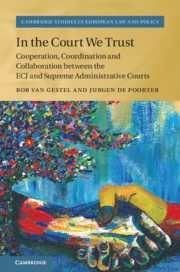 In the Court We Trust
In the Court We Trust Published online by Cambridge University Press: 28 November 2019
Our case law analysis reveals that and how it takes two to tango in terms of organizing a dialogue. From the side of the referring courts closed-questions may force the CJEU to yes or no answers. The same holds true for compatibility questions asking the Court where a national laws are in compliance with EU law while the procedure is not meant to “solve” these problems. A positive way to stimulate dialogue with the CJEU by the referring court could be to make use of the possibility to offer provisional answers to the questions being referred. However, this only works when the CJEU explicitly responds to these answers. The CJEU can also discourage dialogue by reformulating questions in a way that makes the legal problem become unrecognizable to the referring court without issuing a request to the referring court to clarify the questions first. With respect to compatibility questions, the CJEU sometimes almost seems to operate as an appellate court trying to protect citizen’s right by taking over the responsibility of national courts. At the same time, though, the Court shows little interest in what happens with preliminary rulings in the aftermath of its decision.
To save this book to your Kindle, first ensure [email protected] is added to your Approved Personal Document E-mail List under your Personal Document Settings on the Manage Your Content and Devices page of your Amazon account. Then enter the ‘name’ part of your Kindle email address below. Find out more about saving to your Kindle.
Note you can select to save to either the @free.kindle.com or @kindle.com variations. ‘@free.kindle.com’ emails are free but can only be saved to your device when it is connected to wi-fi. ‘@kindle.com’ emails can be delivered even when you are not connected to wi-fi, but note that service fees apply.
Find out more about the Kindle Personal Document Service.
To save content items to your account, please confirm that you agree to abide by our usage policies. If this is the first time you use this feature, you will be asked to authorise Cambridge Core to connect with your account. Find out more about saving content to Dropbox.
To save content items to your account, please confirm that you agree to abide by our usage policies. If this is the first time you use this feature, you will be asked to authorise Cambridge Core to connect with your account. Find out more about saving content to Google Drive.